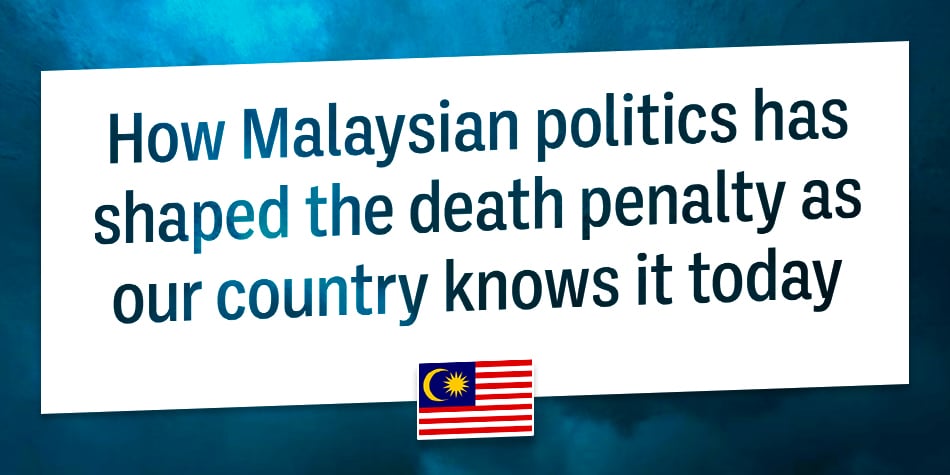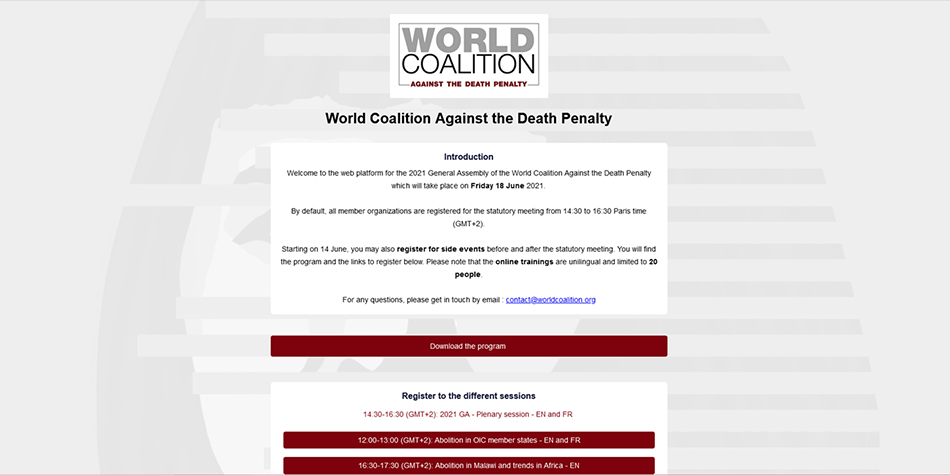
Abolition of the death penalty at the United Nations Human Rights Council 51st session
Advocacy
The United Nations Human Rights Council met for its 51st regular session from September 12 to October 7, 2022. If you missed it, here is what happened regarding the abolition of the death penalty!
DURING THE DEBATES
This session was marked by the official announcement of the appointment of the new Under-Secretary-General Volker Türk to the post of United Nations High Commissioner. Nada Al-Nashif, Acting UN High Commissioner for Human Rights opened the session by welcoming him. Then, the death penalty was raised at various points in the session.
Nada Al- Nashif alerted to the alarming situation in Singapore where eight people were recently executed for drug offences and reiterated the call for an immediate moratorium on the use of the death penalty, especially for non-violent drug crimes.
During the discussion of the human rights situation in Myanmar, the need to immediately reinstate the moratorium on the death penalty was raised.
During OHCHR’s interim oral update on the human rights situation in Belarus, Nada Al- Nashif pointed to amendments to the Criminal Code that extend the death penalty to “attempts to commit acts of terrorism and murders of public officials or public figures” and called on Belarus to impose an immediate moratorium on the application of the death penalty as well as a clear timetable for its full review.
Isha Dyfan, independent expert on the situation of human rights in Somalia, recommends in his report the implementation of a moratorium on the death penalty in the country.
During the Interactive Dialogue with the independent expert on the situation of human rights in the Central African Republic, the abolition of the death penalty in the country was welcomed.
The annual report of the Secretary General on the question of the death penalty was also presented. This report commends the efforts made towards the universal abolition of the death penalty such as those in Kazakhstan, Sierra Leone, Central African Republic and Papua New Guinea. It also highlights the deplorable increase in the number of executions reported in 2021 and 2022, after the global decline during the COVID-19 pandemic. The report calls on states to repeal any provisions that may lead to discriminatory and disproportionate application of the death penalty to poor or economically vulnerable people, foreign nationals, women or people exercising their human rights and more generally calls on states that continue to use the death penalty to adopt a moratorium on executions with a view to abolition.
CIVIL SOCIETY ORAL STATEMENTS ON THE DEATH PENALTY
For this 51st session, several members of the World Coalition Against the Death Penalty presented oral statements on the death penalty.
Under item 3 of the general debate, ECPM together with FIACAT, Advocates for Human Rights, PGA, ASF-France, UIA, LAW-Pakistan, CPR-Japan, CHESO, COCAPEM, and the World Coalition Against the Death Penalty, alerted, in an oral declaration on the considerable increases in death sentences in Iran, Saudi Arabia and recalled the hopes observed in Africa with the abolition of the death penalty in Central African Republic and in Asia with the moratorium on executions in Malaysia. The World Day against the Death Penalty, the 8th World Congress against the Death Penalty and the vote on the UN General Assembly resolution calling for a universal moratorium on the use of the death penalty were mentioned as key upcoming moments for universal abolition. Watch this statement on UN TV.
FIACAT with Advocates for Human Rights, Avocats sans Frontiers (ASF), Ensemble contre la Peine de Mort (ECPM), Parliamentarians for Global Actions and the World Coalition Against the Death Penalty also intervened under this item of the general debate to highlight two possibilities for pursuing the abolitionist trend on the African continent, namely in Ghana and Liberia. The link between the death penalty and torture, the theme of the 2022 World Day against the Death Penalty, made in the Secretary-General’s report on the issue of the death penalty, was also welcomed. Watch this statement on UN TV.
ADOPTED RESOLUTIONS
The Human Rights Council adopted thirty-nine resolutions, one decision and one presidential statement and appointed a new mandate on the human rights situation in the Russian Federation. The mandate of the Working Group on Arbitrary Detention was also extended for a period of 3 years.
SIDE EVENTS
For the first time since the beginning of the covid-19 pandemic, NGOs were allowed to organize side events in the Palais des Nations. Two side events were organized by members of the World Coalition Against the Death Penalty.
- ECPM and the Permanent Missions in Geneva of France, Germany, the European Union and Switzerland organized an event to present the 8th edition of the World Congress against the Death Penalty which will be held in Berlin, from 15 to 18 November 2022.
- The Advocates for Human Rights organized an event to inform Member States on how to address death penalty issues in the upcoming Universal Periodic Reviews which will be held respectively from 07 November 2022 to 18 November 2022 (UPR 41) and from 23 January 2023 – 03 February 2023 (UPR 42). On this occasion, representatives of the members of the World Coalition Against the Death Penalty from Ghana, Indonesia, the Philippines, Pakistan and Bahrain were present to inform the debate.
PARALLEL ADVOCACY ACTIVITIES CONDUCTED BY MEMBERS OF THE WORLD COALITION
In parallel to the 51st session, members of the World Coalition Against the Death Penalty from Ghana, Indonesia, the Philippines, Pakistan and Bahrain, under the coordination of the Advocates for Human Rights, conducted advocacy with Member States for the upcoming 41st and 42nd UPR sessions. The World Coalition members present received training on international advocacy and were able to put their learning into practice for a week.
The fifty-second regular session of the Human Rights Council is scheduled to take place in Geneva from late February to early April.
Categories
Trend Towards Abolition





